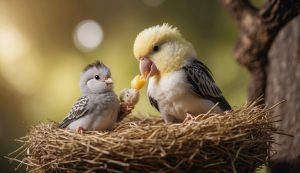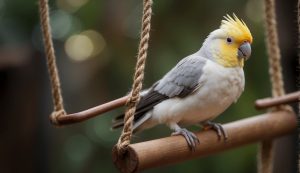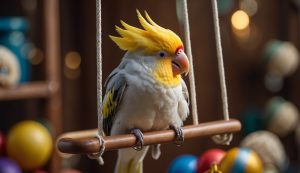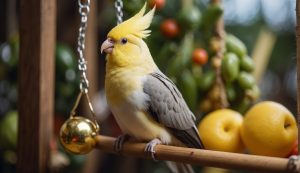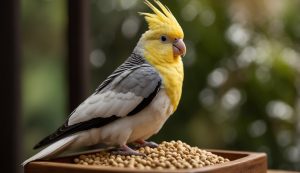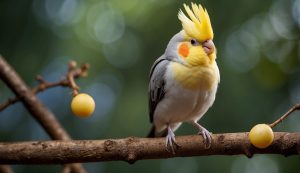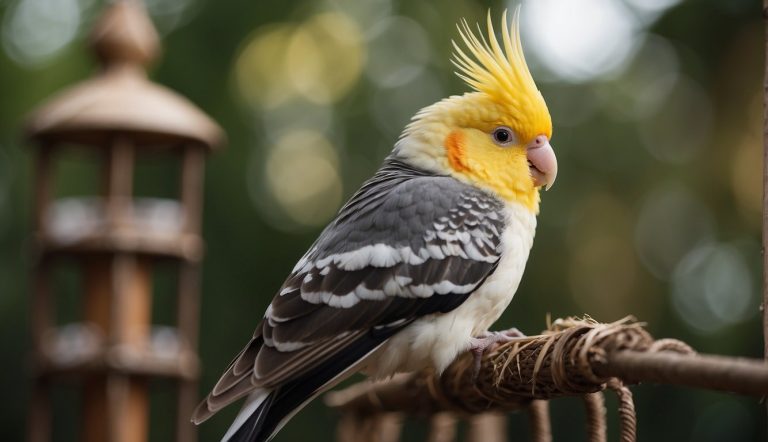Why Is My Cockatiel Chirping So Much? Understanding Your Bird’s Vocal Behavior

Observing my cockatiel as it flits around its cage, I’ve noted with interest the various chirps and sounds it makes throughout the day. These vocal expressions range from soft morning tweets to enthusiastic afternoon chirrings.
If you’ve ever wondered about the frequency or intensity of your cockatiel’s chirping, it’s important to understand that these birds use sound as a primary means of communication.
Just like humans chat when they’re content or call out when they need attention, cockatiels chirp to interact with their environment and express a range of emotions and needs.

The reasons behind a cockatiel’s chirping can be as varied as the sounds themselves.
Environmental factors play a significant role; the arrangement of the cage, the amount of daily activity, and even the weather outside can affect a cockatiel’s vocal behavior.
Additionally, behavioral cues such as the presence of other birds, the desire for social interaction, or the establishment of territory can all prompt a cockatiel to chirp more frequently.
On top of this, health and nutrition significantly influence a cockatiel’s well-being, which is often reflected in their chirping patterns.
Key Points
- Cockatiels use chirping as a form of communication to express emotions and interact.
- The frequency of chirping can be influenced by environmental and social factors.
- Changes in chirping patterns may signal shifts in health or nutritional needs.
Table of Contents
Environmental Influence on Chirping

In my experience, several environmental factors can significantly impact why my cockatiel chirps so much. Let’s explore how cage location, mental stimulation, and social dynamics play roles in their vocal behavior.
Cage Location and Size
I’ve noticed that where I place my cockatiel’s cage can affect its chirping habits.
Cockatiels prefer a comfortable environment that’s not too isolated but also not in the midst of high traffic areas, which can lead to stress and excessive chirping.
Ideally, the cage should be in a spot with plenty of natural light but away from direct sunlight and drafts.
As for the size, it’s clear that a spacious cage allows them to exercise and feel secure, which can help reduce stress-related chirping.
Available Toys and Mental Stimulation
Just like us, cockatiels need entertainment to keep their minds active.
Providing a variety of toys can offer much-needed mental stimulation, which keeps them engaged and can help manage their chirping. I make sure to include:
- Ladders and ropes for exercise
- Mirrors for interaction
- Foraging toys to mimic natural behavior
Switching out the toys periodically keeps things fresh and helps to prevent boredom.
Social Interaction and Flock Dynamics
Cockatiels are social creatures that thrive on interaction which dictates their chirping patterns.
Ensuring they have regular social activities, whether with me or other birds, contributes to a comfortable environment and satisfies their need for company.
Lack of social engagement can lead to excessive chirping, which is often a call for attention. In my home, maintaining a balance of social time and independent play helps keep my cockatiel chirpily content.
Behavioral Aspects of Chirping
In my experience with cockatiels, their chirping behaviors can vary greatly and are impacted by their emotions, the attention they receive, and the level of enrichment they experience in their environment. https://www.youtube.com/embed/EbIDJrAz4rc
Happy Chirps Versus Stress Signals
From what I’ve observed, a cockatiel’s chirp can tell a lot about their emotional state.
Happy chirps are typically melodic and rhythmic, a sign of contentment or an invitation to interact. In contrast, stress signals may come as sharp, repetitive chirps, indicating distress or discomfort.
It’s crucial for me to pay attention to the nuances of their sounds and accompanying behaviors, like posture or feather arrangement, to differentiate between these states.
The Role of Attention and Companionship
Cockatiels are social birds that thrive on attention and interaction.
If I spend significant time engaging with my bird, I notice a cheerful chirping that seems akin to conversational sounds. Lack of interaction, however, can lead to louder and more persistent chirping as they call for a companion or simply signal loneliness.
Boredom and Enrichment Strategies
Boredom can result in a range of chirping behaviors in cockatiels.
To keep my bird’s environment stimulating, I’ve implemented several enrichment strategies:
- Toys: Offering a variety of toys to explore.
- Perches: Placing perches at different levels encourages movement.
- Foraging Opportunities: Creating games that mimic foraging behaviors helps to keep them engaged.
By incorporating these strategies, I mitigate excessive chirping that stems from boredom and ensure my cockatiel remains active and entertained.
Health and Nutrition Related Chirping

In my experience, excessive chirping in cockatiels can often be a signal related to health or nutrition issues. I’ll discuss how symptoms of illness and diet can influence their vocal behavior.
Illness and Discomfort Signs
Observing my cockatiels, I’ve noticed that changes in chirping may indicate health problems.
A cockatiel experiencing a systemic fungal infection or respiratory issues might produce unusual sounds, such as excessive chirping, a change in the pitch of their voice, or even a ‘squeaky’ breathing if the thyroid is enlarged.
Additionally, a ‘crunchy’ sound to their heartbeats can signify lower respiratory infections. These auditory clues are crucial for early detection of potential health issues and prompt veterinary care.
Feeding Habits and Diet Impact
My approach to feeding cockatiels revolves around providing a balanced diet to maintain their overall well-being and to modulate their chirping patterns.
A poor diet can lead to nutritional deficiencies which I’ve observed to cause excessive chirping or a change in their typical vocalizations. Here’s a simple breakdown of what I consider for a healthy cockatiel diet:
- Fresh Water: I provide fresh water daily, as dehydration can cause stress and excessive chirping.
- Variety of Seeds and Pellets: A mix of seeds and pellets ensures they receive a range of nutrients.
- Fresh Fruits and Vegetables: These are essential for vitamins and minerals, which help in reducing stress levels.
- Calcium Sources: Items like cuttlebone can support bone health and reduce the likelihood of stress-related behaviors.
Monitoring my cockatiels’ appetite helps me to assess their well-being; a decrease or increase in appetite can be indicative of stress or illness which, in turn, can affect their chirping frequency and sounds.
Conclusion and Next Steps
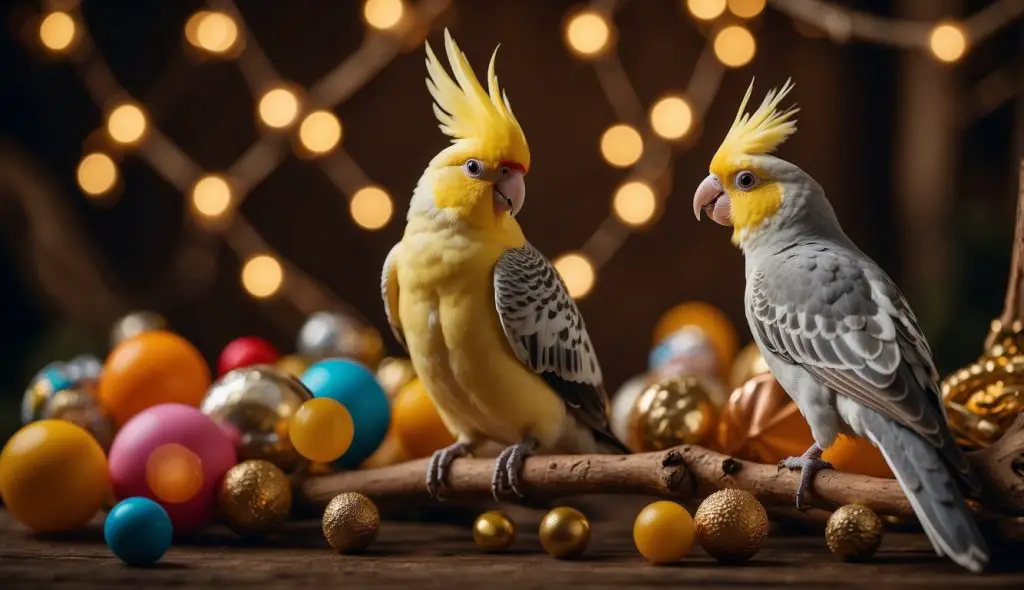
After observing my cockatiel’s increased chirping, I’ve come to recognize this behavior often signals a variety of needs or emotions.
It’s my responsibility to ensure I’m meeting those needs and understanding the nuances of their behavior.
Firstly, I’ll make sure their habitat is comfortable, with plenty of stimulation.
I’ll regularly introduce new toys and rearrange the cage to keep their environment engaging.
Next, daily interaction is key to strengthen our bond.
I’ll set aside time each day for play and learning new tricks, which should also help alleviate any signs of boredom or stress.
For their well-being, a routine health check is also crucial.
If the chirping persists or if there are any signs of distress, I won’t hesitate to consult a vet.
It’s better to be safe and ensure that their vocalizations aren’t indicative of any underlying health issues.
Table Summarizing My Action Plan:
| Action Item | Purpose | Frequency |
|---|---|---|
| Habitat enrichment | Stimulate and comfort | Ongoing |
| Daily interaction and bonding | Strengthen bond, reduce stress | Daily |
| Routine health checks | Ensure well-being | Annually |
Frequently Asked Questions

In this section, I’ll address some common concerns and patterns you might notice if your cockatiel is chirping excessively.
What causes my cockatiel to chirp loudly at night?
My cockatiel may chirp loudly at night due to a lack of darkness or quiet, which can disturb their sleep cycle. Ensuring a calm and dark environment might help reduce their nighttime chirping.
Is it normal for my cockatiel to chirp excessively in the morning?
Yes, it’s normal for my cockatiel to chirp more in the morning. This behavior is often related to their natural instinct to communicate with their flock at dawn.
Why does my cockatiel get louder when I’m not in the room?
My cockatiel might get louder when I leave the room. They are social creatures and may chirp more to call for my attention or signal their displeasure at being left alone.
What could be the reason behind my bird’s sudden increase in chirping?
A sudden increase in chirping can sometimes indicate that my cockatiel is stressed, curious, or excited about something in their environment. This might be a new toy or change in routine.
Why won’t my cockatiel remain quiet?
Cockatiels are naturally vocal, and my pet may not remain quiet if it’s feeling playful, seeking attention, or responding to sounds it hears around the house.
Could there be a health reason for my cockatiel’s constant chirping?
Constant chirping can occasionally be a sign that my cockatiel is in discomfort or pain. So, I should monitor for other symptoms of illness.
I should also consider consulting a vet if the chirping is accompanied by any changes in behavior or appearance.

